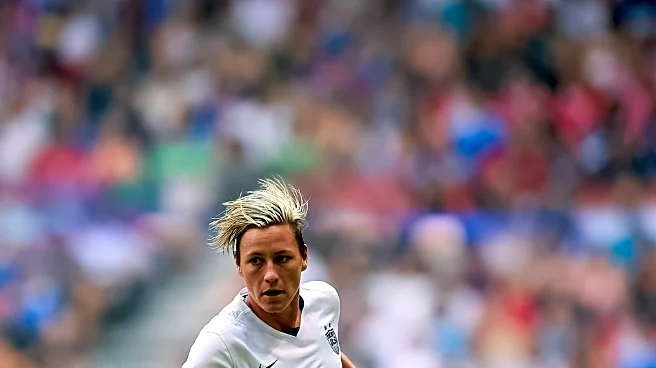What's Happening?
Abby Wambach, a two-time Olympic gold medalist and former U.S. Women's National Team soccer star, has shared her insights on parenting during an interview on NBC's 'TODAY Show.' Wambach emphasized the
importance of allowing children to attend sports practices without parental supervision. She argues that this absence can help children develop resilience, conscientiousness, and internal motivation, which are crucial traits for their growth into successful adults. Wambach, who is also a member of the National Soccer Hall of Fame and a parent to three step-children, suggests that parents should drop their kids off at practice and engage in other activities rather than watching from the sidelines. She believes that parental presence can lead to children outsourcing their motivation, potentially making them nervous or overly eager to impress. Wambach's perspective is supported by neuropsychologist William Stixrud, who advocates for encouraging children to develop a sense of agency to become self-motivated adults.
Why It's Important?
The advice from Abby Wambach highlights a significant shift in parenting strategies, emphasizing the development of internal motivation and independence in children. This approach can have long-term benefits for children's personal and professional lives, as it encourages them to become self-starters who strive for excellence regardless of external validation. By fostering these traits, parents can help their children navigate challenges and opportunities more effectively, potentially leading to greater success in adulthood. The broader impact of this parenting style may influence educational and sports institutions to reconsider the role of parental involvement in children's activities, promoting environments that support autonomy and self-driven growth.
What's Next?
Parents and educators may begin to adopt Wambach's recommendations, leading to changes in how children's sports practices are conducted. This could involve creating more supportive environments that prioritize children's independence and self-motivation. Additionally, discussions around parenting strategies may gain traction, encouraging more parents to explore methods that focus on developing their children's internal drive. As these ideas spread, there may be increased interest in research and resources that support this parenting approach, potentially influencing public policy and educational practices.
Beyond the Headlines
Wambach's advocacy for parental absence at sports practices touches on deeper cultural and ethical considerations regarding parenting and child development. It challenges traditional notions of parental involvement, suggesting that less direct supervision can lead to more empowered and self-reliant children. This perspective may spark debates about the balance between guidance and independence in parenting, as well as the societal expectations placed on parents to be constantly present in their children's lives. The long-term cultural shift could redefine how success and motivation are perceived in the context of child development.









